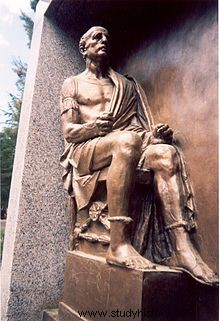
"Ecce Homo", painting by Antonio Ciseri in which Pontius Pilate presents Jesus scourged to the crowd
Who was Pontius Pilate ?
What do we know about the Roman governor of Judea who sent Jesus of Nazareth to death ?
Very little, in truth almost nothing.
Unverifiable chatter, more or less credible hypotheses and imaginative inventions allow us to reconstruct their life and character traits with an approximation of their own more legendary characters than historical ones.
For the news.it portal I was able to obtain, looking for information here and there, a short biography of Pilate which I propose again below.

Statue of Pontius Pilate in San Giovanni Rotondo
Biographical information on Pontius Pilate they are scarce and uncertain:for everyone, everywhere, he is simply the man who sentenced Jesus to death.
Nor is this surprising given that the only historical source on this character was represented, until a few decades ago, by the Gospels , without any possibility of comparison.
Only in 1961 , thanks to a casual discovery, it was found in the theater of Caesarea , in Israel, a Roman epigraph with the inscription "Pontius Pilatus, praefectus Iudeae", unequivocal proof of the truthfulness of what is stated in the Holy Scriptures.
Origins of Pontius Pilate and hypotheses on death
Pilate probably belonged to the Vestina family of the Pontii , of Samnite origin, and the equestrian class.
The young man reluctantly accepted the office of governor in the distant Jewish province, where he remained for ten years distinguishing himself for the harshness with which he used to repress the frequent rebellions by the inhabitants of the region, never resigned to the condition of subjection towards Rome.
Absolute uncertainty reigns over the last years of Pilate's life.
For some he was executed by the Emperor Caligula , according to others he was exiled to Gaul where he committed suicide, finally someone even wants him to be penitent and converted to Christianity, also under the influence of his wife Claudia Procula , who had tried in every way to persuade him not to send Jesus of Nazareth to death ( see also :https://www.pilloledistoria.it/1729/storia-antica/come-mori-ponzio-pilato).
The trial of Jesus and his wife Claudia
And precisely with regard to the most famous trial in history, Pilate's reluctant attitude to express himself for the extreme sentence is evident.
The words, the appearance, the humility and the manners of the young Nazarene brought before him struck him deeply and it was impossible for him to blame him that could justify what he was asked to do.
And in fact Pilate hesitated, took time, asked for advice, postponed.
Eventually, the governor played Barabbas, 's extreme card but he failed to prevent a sentence that he felt was obviously unfair.
Perhaps, as a good and somewhat superstitious Roman, he was also afraid of divine punishment for having been responsible for that unjustly shed blood.
Pilate had no children but was bound by sincere love to his wife Claudia, a cultured, intelligent woman and grandson of Augustus, therefore belonging to one of the most illustrious and powerful Roman families.
It seems that the man held his wife's opinions in high regard, and certainly they ended up influencing his political decisions (Article taken from:Notizie.it).
